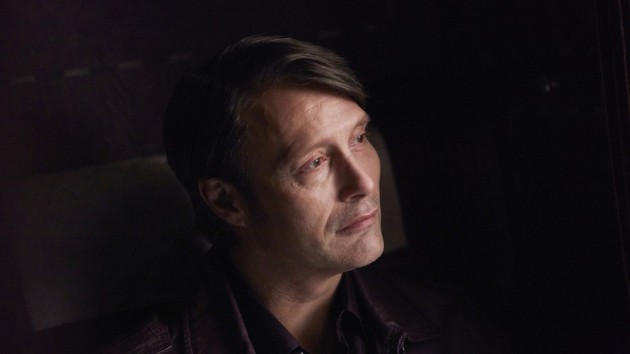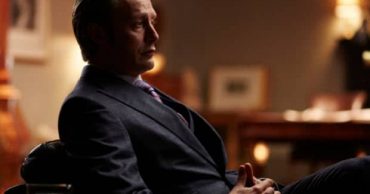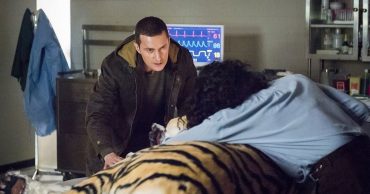
Ever the eloquent performer for his own implied audience, Hannibal Lecter tells newcomer Anthony Dimmond (Tom Wisdom) that “one can appreciate another’s words without dissecting them…though, on occasion, dissection is the only thing that will do.” It is a piece of dialog which epitomizes the writing in Bryan Fuller’s Hannibal: playful, precise and provocative. Like the violence that the series depicts, one can attempt the fool’s errand of shrugging off the layering of the dialog. You can remind yourself that this is just television and none of it is real just as easily as you can think that Hannibal talking about dissection is simply a fun wink to the viewer. But the horror of Hannibal‘s violence is inescapable; so, too, is the depth of meaning in its philosophizing. We cannot help but dissect things (this website and countless others like it would not exist otherwise). Yet, Hannibal’s first point–that appreciation and dissection can be mutually exclusive–is an essential one. To appreciate a piece of work only on the aesthetical level is to enter into a debate. Speaking to Larry McCaffery in 1993, novelist David Foster Wallace criticized television for catering to audiences’ desires to feel pure pleasure while watching something without the pain of real-life experience. Regarding readers, Wallace said “the problem isn’t that today’s readership is ‘dumb’, I don’t think. Just that TV and the commercial-art culture’s trained it to be sort of lazy and childish in its expectations. But it makes trying to engage today’s readers both imaginatively and intellectually unprecedentedly hard.” These ideas about readers can be applied to viewers of television by looking at how much network programming–vapid, banal, purposefully unimaginative–has trained audiences to expect less or, worse, to expect something easy. I don’t mean to pick on anyone in particular, but there is nothing difficult about watching an episode of NCIS. It is a perfectly-constructed meal of programming meant to satisfy the viewer week in and week out. This is where the debate is strongest. Is pure, easy appreciation of something (and just how perfect NCIS‘s structure equally important to its ability to stand up to dissection? Is Wallace right to criticize viewers for wanting 100% pleasure without the hard-to-define difficulty that comes with hard-to-define depth? Wallace, speaking in 1993 and dying in 2008, would have only caught the beginning of the immensely creative movement television has undergone, and a series like Hannibal is an example of how the nature of the conversation has changed. Hannibal is of a rare breed of series that truly engages viewers “both imaginatively and intellectually” by allowing them to appreciate it without dissecting it, yet recognizing that, on occasion, dissection is the only thing that will do. So, as engaged viewers, let us dissect and appreciate “Antipasto,” since doing anything less would be extremely rude.
The issue of aesthetics is one that “Antipasto” is especially concerned with. Bedelia Du Maurier confronts Hannibal on the subject: “You no longer have ethical concerns, Hannibal. You have aesthetical ones.” Again, though, are purely aesthetical concerns something Hannibal should be worried about? Like the Hannibal series itself, Dr. Lecter is constantly undergoing change. Shocked out of his island of isolation by Will Graham in the first season, Hannibal’s ethics have become fluid. For every moment similar to the mentioning of how the doctor employs an “ethical” butcher, he is portrayed as someone who most people would consider unethical in his treatment of fellow human beings. Even his supposed friend, Will, is pushed to potentially harmful places for the purpose of studying new ways in how the brain functions. Hannibal’s aesthetical concerns, though, have been firmly consistent. In addition to the obvious interest he has in how something looks–food, outfits, interior decoration–Hannibal has always been motivated by curiosity. He wants to see what will happen in any given situation and how someone will act, which is another way of looking at something aesthetically. There is a beauty that Hannibal sees in the natural impulse of a person, and one of his greatest joys is manipulating those impulses and witnessing the changes in someone else so that their actions are like works of art that he has created. This is why characters like Will and Bedelia offer him so much more than the victims who grace his dinner table. Bedelia’s resistance is challenging, giving her the potential to become one of his masterpieces. She may believe she is still consciously in control of her actions, but that is a battle she is bound to lose without some kind of help. Aesthetical concerns, then, are more important to Hannibal as a series than ethical ones. Whereas a show like Dexter made ethical dilemmas part of its driving force, we are more interested in how Hannibal acts than we are in why he acts that way, possibly because the character is often impenetrable, making ethical inquiries almost useless. The murder of Anthony is an act that isn’t explicit in its purpose; we infer, of course, and any reason that puts Hannibal in jeopardy is a good enough reason for him to kill, but director Vincenzo Natali focuses more on the things happening around the murder–including the aesthetics–than the murder itself.
Part of that focus is Bedelia, who is put into yet another dichotomy: observe or participate. Like the tension between aesthetics and ethics, the relationship between observation and participation has been integral to Hannibal‘s narrative. Will is a character who participates through observation, blurring the distinction. Hannibal, as a psychiatrist, observes his clients until he is moved to participate in their lives. Here, though, observation versus participation has to do with Bedelia’s complicity and culpability. Bedelia believes she is observing, but Hannibal probes her with questions. Was she anticipating his and Anthony thoughts? Their counter-thoughts? Their rationalizations? That level of cognition, Hannibal believes, moves Bedelia from the role of observer to one of a participant. She is not a physical instrument in Anthony’s death in the traditional sense, but she takes part in it by being active psychologically. That’s a difficult idea to wrap one’s head around, especially considering Will’s role last season. How culpable was Will, given that his intentions were submerged in an intricate revenge plot? At one point do the means overpower the end? This is the inner-struggle of Dr. Du Maurier, who may have similarly nuanced plans to bring Hannibal his reckoning, but who has to participate as part of those plans. And if Will was in danger of losing himself in that process, it’s a grim outlook for Bedelia as well, even if she is as strong-willed as she claims and appears to be.
Strength–Bedelia’s or anyone else’s–really isn’t enough when dealing with Hannibal, who is a thorough manipulator of the senses. “Antipasto” feeds his own ego by giving him the opportunity to display the multifaceted nature of his charm, which is a part of what seduces his prey into being manipulated. All at once, he is able to publically shame Sogliato (Rinaldo Rocco), flaunt his multicultural breadth of knowledge and captivate a new audience like a professional storyteller. He recites Dante from memory, picking the very Hannibal-like first sonnet that appears in La Vita Nuova:
To every loving heart and captive soul
into whose sight these present words may come
for some elucidation in reply,
greetings I bring for their sweet lord’s sake, Love.
The first three hours of night were almost spent,
the time that every star shines down on us,
when Love appeared to me all of a sudden,
and I still shudder at the memory.
Joyous Love looked to me while he was holding
my heart within his hands, and in his arms
my lady lay asleep wrapped in a veil.
He woke her then and trembling and obedient
she ate that burning heart out of his hand;
weeping I saw him then depart from me.
The image of Dante’s lady eating his heart from Love’s hand is another instance in which Hannibal invites us to appreciate while also challenging us to dissect. We know that Hannibal loves in his own peculiar way. His love for Will is undeniable, which is why his reaction to Will’s betrayal is so sincerely severe. Hannibal, like Love in Dante’s sonnet, also beckons to characters (especially female ones in his quest to replace his dead sister) to destroy the things they love. It’s easy, then, to see Abigail as a representation of Dante’s lady, even though Will’s love for Abigail was not of the romantic variety. Another parallel might be Margot Verger, a “love” of Mason Verger, who is urged to destroy her brother under Hannibal’s influence. Dante seems to fit both Hannibal and Hannibal so cleanly that it’s hard to believe his poetry hasn’t been a part of the series’ narrative framing since the beginning. Now, Bedelia finds herself in the lady’s position, encased in Love’s arms with so very few options but to tremble and obey.
These exercises in dissection may seem counterproductive to a certain kind of viewer–one who feels that appreciation is satisfactory when considering a work of art. Why, then, should dissection be a consideration when experiencing Hannibal? For a series elevated so laughingly far above any other show on television in terms of visual and aural artistic prowess, what reason is there for the viewer to go that extra mile? To answer this, I would refer back to David Foster Wallace. In another conversation, this time with KCRW’s Michael Silverblatt, Wallace’s interview praised his novel Infinite Jest “because of the extraordinary effort that was going into writing it. It didn’t seem like difficulty for difficulty’s sake. It seemed like immense difficulty being expended, because something important about how difficult it has become to be human needed to be said and that there weren’t other ways to say that.” And that is a description I would just as soon use to describe Bryan Fuller’s Hannibal. The difficulty in watching Hannibal is in giving yourself over to the psychological trauma it forces its characters and viewers to go through on the conscious level (and the subconscious reverberations that I’m sure many other viewers other than myself will have experienced long after watching an episode). That difficulty, however, isn’t gratuitous. Unlike so many other serial killer series, Hannibal has no interest in gratuity for its own sake. The difficulty of Hannibal–the reason it actively disturbs the comfortable–is in service of its worldview, which is deeply, deeply cathartic. Even “Antipasto,” with no interest in addressing the devastation following “Mizumono” through the eyes of its victims, is persistent in reminding us of Hannibal‘s karmic justice. Through Abel Gideon, we are reminded that Hannibal’s time will come–and soon, if he’s remembering those tidings while in Italy. A distant appreciation of “Antipasto” prevents that reassurance and prevents the comforting of the disturbed. Otherwise, Gideon’s scenes are flawlessly entertaining, Eddie Izzard chewing scenery like no other. Dissecting those scenes, on the other hand, helps viewers to understand and live with the daily horror of the world. It’s safe to assume that we don’t meet people like Hannibal Lecter in our everyday lives, but it’s unlikely we live avoiding evil in some form, however each one of us defines that individually. Evil can seem invincible in the same way that Hannibal Lecter does, but it isn’t. As we progress further into Will and Hannibal’s story, it’s important to be reminded of that.
Bite-Sized Thoughts – Buon appetito!
– A note on these reviews: this will be the space for shorter observations and the more evaluative stuff, like “this was good” and “this was less good.” I subscribe more to dissection than appreciation, and the reviews will usually reflect that.
– A note on ratings: I love assigning scores, but Hannibal is beyond them. This is, I think, the best series on television, so a score of 8 for an episode of Hannibal is equivalent to a 10, generally. The ratings for this season will be in the context of previous episodes of this series.
– The motorcycle ride that opens this episode, along with Bedelia’s bathtub scene, strongly evoke last year’s Under the Skin, which was my favorite film from 2014. It’s only now that I notice how obvious the similarities to the music in both Under the Skin and Hannibal are–totally overbearing.
– Welcome Gillian Anderson to the opening credits and notice that Hugh Dancy’s name appears above Mads Mikkelsen’s, despite Will not being in the episode (their names alternate being on top, week to week).
– “You smoked me in thyme.” Gideon’s amusement at this mimics ours, since the wordplay on thyme is quintessential Hannibal.
– “This isn’t cannibalism, Abel. It’s only cannibalism if we’re equals.” That was the old Hannibal. You know, the one who had ethical concerns in addition to aesthetical ones?
– “Let it be a fairy tale, then. Once upon a time…” This is such a fantastic way to introduce where Hannibal and Bedelia begin this season. Plenty of parallels to Hannibal and fairy tale structuring, but…don’t think I’d ever want Dr. Lecter to tell me a fairy tale before going to sleep. Or before eating myself, for that matter.
– “You seem more interested in making appearances than maintaining them.” That’s certainly a stark contrast to how Hannibal used to be. The maintaining of his appearance is what kept him safe throughout most of the first two seasons. Still, nothing wrong with being interested in making appearances, especially if you get the band to stop playing while you recite Dante.
– “Your peace is without morality.” “Morality doesn’t exist. Only morale.” Does anyone want to tackle this one? The dialog in this series is sometimes so abstract that it defies dissection. Hannibal finding a kind of peace in Florence, though, might speak to his relinquishing of ethics and immersion in aesthetics. Sorry if I’m beating a dead horse, here…a dead horse…in which I sewed up my social worker.
– Vera Dal 1926 is apparently from the novel Hannibal, which this season will take some inspiration from (in addition to Hannibal Rising and, ultimately, Red Dragon).
– Very unusual synth usage in this episode, but since that–for me–is the trademark progressive rock sound, it fits with the progressive style of Hannibal‘s style.
– It’s not that kind of party.
– Bedelia is shown through the lends of a CCTV camera, which could mean one of a couple things. Maybe she is putting her face out there in hopes of facial recognition software placing her, and thus Hannibal. Or maybe we’re just meant to be getting a sense of being watched for this season. In the opening, when Hannibal removes his helmet, the camera also opens and closes like a shutter.
– That’s Zachary Quinto who has Gillian Anderson’s arm down his throat. More of him to come later in the season as Bedelia’s former patient, but that is how you make an entrance on Hannibal.
– Touching on that, we see how Abigail’s story parallels Bedelia’s in retrospect. After killing her patient, Hannibal offers Bedelia help if she’s willing to ask for it. Hannibal did the same thing after Abigail killed Nicholas Boyle.
– “Snails aren’t the only creatures who prefer eating with company. If only that company could be Will Graham.” That’s right, Abel. Get him where it hurts!
– Abel is also Bedelia’s predecessor in the sense of being someone under Hannibal’s sway who still believes he possesses autonomy. It’s stubborn, but it might be true. And it might actually help postpone Hannibal’s wrath, depending on the person.
Hannibal by the Numbers:
– A note on this section: these are all estimates. I don’t have the script in front of me, so it’s down to my ear and better judgment to guess where one line of dialog has end punctuation and where others continue.
Speaking Roles in “Antipasto”:
1. Hannibal, 144 lines
2. Anthony, 61 lines
3. Bedelia, 55 lines
4. Gideon, 42 lines
5. Sogliato, 21 lines
6. Roman, 2 lines
7. Albizzi, 1 line
Total: 7 speaking roles, 326 lines
31 total scenes
Longest scene by line count: first flashback with Gideon, 35 lines
Shortest scene by line count: 10-way tie, 0 lines
Extraneous observation: 18 out of 31 scenes contain 5 or fewer lines of dialogue
[Photo via NBC]
 Follow Us
Follow Us






I give your review a 10 out of 10 also!! Hannibal is to magnificent a show to just have a normal type of review. Let the dissection begin!!
Thanks, Paul!